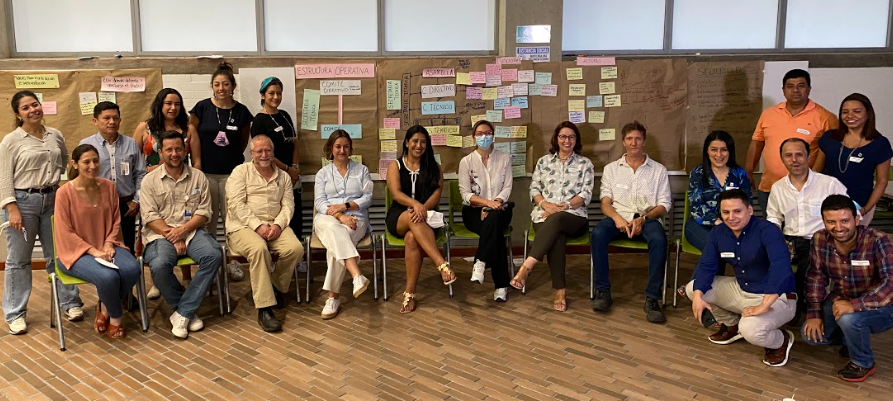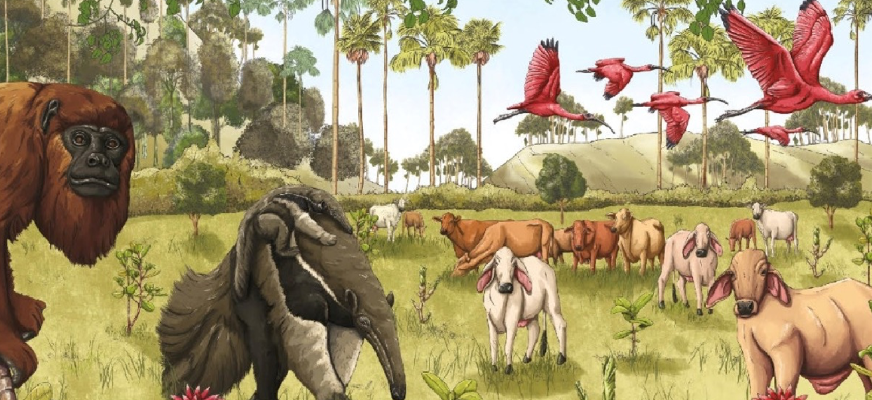Global Governance Experiences of Jurisdictional Initiatives
Villavicencio, March 24, 2022 – TFA Colombia, WWF, TNC and Asorinoquia invited members of the Sustainable Orinoquia Pact and other entities in the region to learn about valuable governance experiences from multi-stakeholder platforms in jurisdictions in Indonesia, Brazil and Colombia, inspiring the implementation of the Pact, which has reached a new stage with its recently developed Action Plan. The exchange was followed by workshops carried out among members to advance the discussion on the governance structure of the SOP (Sustainable Orinoquia Pact).

The Sustainable Orinoquia Pact is a multi-stakeholder alliance that seeks to consolidate a joint vision and effort between the environmental sector and the main productive sectors of the Orinoquia region. To achieve its goals of aligning the interests of conservation, production and social welfare, the Pact establishes a space for dialogue, participation and action for multiple sectors: national and regional government, private sector, academia, multilateral agencies, research institutions and civil society organizations with current or planned presence and activities in the Orinoquia region.“The Pact establishes itself as a multi-stakeholder contribution to reduce risk in supply chains, creating the possibility of territorial differentiation, and aims to promote multi-stakeholder platforms that unify existing processes and initiatives that point in the same direction”.
The Pact establishes itself as a multi-stakeholder contribution to reduce risk in supply chains, creating the possibility of territorial differentiation, and aims to promote multi-stakeholder platforms that unify existing processes and initiatives that point in the same direction
Javier Ortiz,
Coordinator TFA Colombia &
Andes Amazonia Program Manager
Similarly, Claudia Vásquez, Director of TNC Colombia, highlighted the advances of the Sustainable Orinoquia Pact in its stage 1 and its power to “mobilize collective action around its three axes that represent gains for nature, for the sectors and for the people, with all aspects articulated in such a way as to achieve the expected results”.
Within the international panel “Management of multi-stakeholder initiatives: lessons learned from Indonesia, Brazil and Colombia“, Paula Caballero, Regional Executive Director of TNC for Latin America, pointed out that tThe sustainability of the Pact requires the proactive involvement of all members in the work towards the consistency, ownership and creation of development models without degradation and innovative financial mechanisms”.
Additionally, José Otavio Passos, Director of Systemic Change in the state of Pará, TNC Brasil, mentioned how “the drafting of public policies in Pará has come about through collective construction based on projects initiated jointly with government organizations and international cooperation, playing a key role in the collective drafting of policies”.
Closing the international panel, Gita Syahrani, Executive Director of the Secretariat of the Association of Sustainable Districts in Indonesia, explained how “innovation centers have been consolidated in her country as a key element for the consolidation of jurisdictional initiatives, as innovation becomes an anchor in terms of information and data. She also highlighted the need for a monitoring tool that enables the reporting of results and progress, based on defined goals with specific financing needs that can be met through incentive mechanisms”.
In the national panel “different interests and a common purpose: multi-stakeholder experiences for a Sustainable Orinoquia” Milena Zapata, Intersectoral Specialist in Governance of WWF Colombia, emphasized the importance of governance as an articulating axis in the Water Custody platform, contributing to water sustainability and to the conduction of collective actions.
Germán Serrano, Technical Secretary of the Colombian Sustainable Livestock Initiative, presented the proposal for a National Reference Framework for Sustainable Livestock Landscapes, with its Interpretation for Meta, as a sectoral intervention approach to achieve sustainable livestock landscapes.
The panel closed with María Adelaida Fernández, Director of the Earth Innovation Institute, who presented the experience of a pilot implementation of the Landscale tool for monitoring jurisdictional performance in the department of Caquetá, highlighting the importance of having a governance structure in place that is aligned to the regional vision and that monitors its progress, thus helping the platform to stay on track and not deviate from the established goals.
Finally, the members of the pact made progress in the proposal of an operational and governance structure for the pact, defining the roles of the different actors and identifying key actors to be included in the pact, and subsequently agreeing on the steps to be taken in this process.
